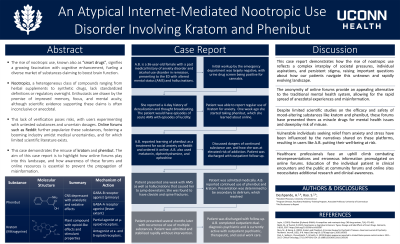Back


(109) An Atypical Case of Internet-Mediated Nootropic Use Disorder Involving Kratom and Phenibut
Saturday, April 6, 2024
9:45 AM – 1:15 PM

Has Audio

Ajit Deshpande, MD
Resident Physician
University of Connecticut, Connecticut
Surita Rao, MD, FASAM
Program Director, Psychiatry Residency Training Program. Associate Professor
University of Connecticut UConn Health, Connecticut
Presenter(s)
Non-presenting author(s)
Background & Introduction: The rise of nootropic use, known also as “smart drugs”, signifies a growing fascination with cognitive enhancement, fueling a diverse market of substances claiming to boost brain function. Nootropics, a heterogeneous class of compounds ranging from herbal supplements to synthetic drugs, lack standardized definitions and regulatory oversight. Enthusiasts are drawn by the promise of improved memory, focus, and mental acuity, although scientific evidence supporting these claims is often inconclusive or anecdotal.
While some nootropics, like modafinil and -racetams have been studied, many other substances have been touted as having nootropic properties despite their effects and safety profiles are not fully understood. This lack of verification poses risks, with users experimenting with untested substances and uncertain dosages. Online forums such as Reddit further popularize these substances, fostering a booming industry amidst medical uncertainties, and for which limited scientific literature exists.
This case demonstrates the misuse of kratom (an herbal substance that can produce opioid- and stimulant-like effects) and phenibut (a CNS depressant). The aim of this case report is to highlight how online forums play into this landscape, and how awareness of these forums and online resources is essential to prevent the propagation of misinformation.
Case Description: A.B. is a 36-year-old female with a past medical history of unspecified anxiety disorder and alcohol use disorder in remission, who initially presented to the emergency department with acute onset altered mental status.
On initial encounter, A.B. was accompanied by her husband. She reported a 4-day history of loss of touch with reality, derealization, thought broadcasting, and disassociation. Per husband, the patient would have episodes of being acutely altered, followed by episodes of lucidity. During evaluation,, patient was understandably concerned but otherwise fully oriented and cooperative. Patient has difficulty recalling the past few days, but was able to report regular use of Kratom and kava root for anxiety. She additionally notes that roughly a week ago she started taking phenibut, which she learned about on the online social news aggregation website, Reddit.
A.B. reported that on the online forum, it was stated that it was efficacious in management of social anxiety. Patient ordered medications online but did not know much more information about the substance itself. Psychoeducation was provided regarding dangers of continued substance use, and how she was at particularly elevated risk of developing addiction to other substances due to her pre-existing alcohol use disorder. A plan was developed with the patient for cessation of substance use and outpatient psychiatric follow-up.
Patient presented one week later to the emergency department with a recurrence of altered mental status as well as auditory and visual hallucinations which subsequently contributed to her jumping off the stairs as the voices said they would catch her and subsequently sustaining a fracture to her clavicle and 3 spinous processes. Patient was admitted medically for management of the fall. During the hospitalization, A.B. reported continued use of phenibut and kratom, as well as excessive quantities of melatonin. It was determined presentation was secondary to substance induced hyperactive delirium, which resolved over course of hospitalization.
Patient presented to the emergency department once more several months later with recurrence of hyperactive delirium in the setting of return to use of multiple substances inclusive of ephedrine, diphenhydramine, kratom and kava. Patient was admitted to the inpatient psychiatric unit, where she stabilized rapidly without pharmacologic intervention. Patient was discharged with follow-up. A.B. is currently actively engaged in outpatient dual-diagnosis psychiatric and social work care.
Conclusion & Discussion: The goal of this case report is to demonstrate how the rise of nootropic use reflects a complex interplay of societal pressures, individual aspirations, and a lack of comprehensive scientific understanding, raising important questions about how our patients navigate this unknown and rapidly evolving landscape. The anonymity of online forums provide an appealing alternative to the labyrinthine mental health system, offering an accessible avenue to explore nootropic use. These forums, often lacking credible scientific oversight, have allowed the rapid spread of anecdotal experiences and misinformation. Despite limited scientific studies on the efficacy and safety of substances like kratom and phenibut, these forums have presented them as miracle drugs for mental health issues.
As such, vulnerable individuals like A.B., seeking relief from anxiety and stress, have been influenced by the persuasive narratives shared on these platforms. The consequences of this misinformation are of significant concern, as unsuspecting users like the aforementioned patient, misled by online pseudoscience, have put their well-being at risk.
Healthcare professionals face an ongoing challenge in combating these online narratives and promoting accurate, evidence-based information to ensure public safety and mental health, for which increased clinician awareness and additional research is needed.
References: Lapin, I. (2001). Phenibut (β‐phenyl‐GABA): A tranquilizer and nootropic drug. CNS drug reviews, 7(4), 471-481.
Malík, M., & Tlustoš, P. (2022). Nootropics as Cognitive Enhancers: Types, Dosage and Side Effects of Smart Drugs. Nutrients, 14(16), 3367. https://doi.org/10.3390/nu14163367
Mun, M., & Wong, A. (2020). Kratom and Phenibut: A Concise Review for Psychiatric Trainees. American Journal of Psychiatry Residents’ Journal, 16(2), 6–8. https://doi.org/10.1176/appi.ajp-rj.2020.160203
Post, S., Spiller,H., Chounthirath, T., & Smith, G. (2019) Kratom exposures reported to United States poison control centers: 2011–2017, Clinical Toxicology, 57:10, 847-854, DOI: 10.1080/15563650.2019.1569236
While some nootropics, like modafinil and -racetams have been studied, many other substances have been touted as having nootropic properties despite their effects and safety profiles are not fully understood. This lack of verification poses risks, with users experimenting with untested substances and uncertain dosages. Online forums such as Reddit further popularize these substances, fostering a booming industry amidst medical uncertainties, and for which limited scientific literature exists.
This case demonstrates the misuse of kratom (an herbal substance that can produce opioid- and stimulant-like effects) and phenibut (a CNS depressant). The aim of this case report is to highlight how online forums play into this landscape, and how awareness of these forums and online resources is essential to prevent the propagation of misinformation.
Case Description: A.B. is a 36-year-old female with a past medical history of unspecified anxiety disorder and alcohol use disorder in remission, who initially presented to the emergency department with acute onset altered mental status.
On initial encounter, A.B. was accompanied by her husband. She reported a 4-day history of loss of touch with reality, derealization, thought broadcasting, and disassociation. Per husband, the patient would have episodes of being acutely altered, followed by episodes of lucidity. During evaluation,, patient was understandably concerned but otherwise fully oriented and cooperative. Patient has difficulty recalling the past few days, but was able to report regular use of Kratom and kava root for anxiety. She additionally notes that roughly a week ago she started taking phenibut, which she learned about on the online social news aggregation website, Reddit.
A.B. reported that on the online forum, it was stated that it was efficacious in management of social anxiety. Patient ordered medications online but did not know much more information about the substance itself. Psychoeducation was provided regarding dangers of continued substance use, and how she was at particularly elevated risk of developing addiction to other substances due to her pre-existing alcohol use disorder. A plan was developed with the patient for cessation of substance use and outpatient psychiatric follow-up.
Patient presented one week later to the emergency department with a recurrence of altered mental status as well as auditory and visual hallucinations which subsequently contributed to her jumping off the stairs as the voices said they would catch her and subsequently sustaining a fracture to her clavicle and 3 spinous processes. Patient was admitted medically for management of the fall. During the hospitalization, A.B. reported continued use of phenibut and kratom, as well as excessive quantities of melatonin. It was determined presentation was secondary to substance induced hyperactive delirium, which resolved over course of hospitalization.
Patient presented to the emergency department once more several months later with recurrence of hyperactive delirium in the setting of return to use of multiple substances inclusive of ephedrine, diphenhydramine, kratom and kava. Patient was admitted to the inpatient psychiatric unit, where she stabilized rapidly without pharmacologic intervention. Patient was discharged with follow-up. A.B. is currently actively engaged in outpatient dual-diagnosis psychiatric and social work care.
Conclusion & Discussion: The goal of this case report is to demonstrate how the rise of nootropic use reflects a complex interplay of societal pressures, individual aspirations, and a lack of comprehensive scientific understanding, raising important questions about how our patients navigate this unknown and rapidly evolving landscape. The anonymity of online forums provide an appealing alternative to the labyrinthine mental health system, offering an accessible avenue to explore nootropic use. These forums, often lacking credible scientific oversight, have allowed the rapid spread of anecdotal experiences and misinformation. Despite limited scientific studies on the efficacy and safety of substances like kratom and phenibut, these forums have presented them as miracle drugs for mental health issues.
As such, vulnerable individuals like A.B., seeking relief from anxiety and stress, have been influenced by the persuasive narratives shared on these platforms. The consequences of this misinformation are of significant concern, as unsuspecting users like the aforementioned patient, misled by online pseudoscience, have put their well-being at risk.
Healthcare professionals face an ongoing challenge in combating these online narratives and promoting accurate, evidence-based information to ensure public safety and mental health, for which increased clinician awareness and additional research is needed.
References: Lapin, I. (2001). Phenibut (β‐phenyl‐GABA): A tranquilizer and nootropic drug. CNS drug reviews, 7(4), 471-481.
Malík, M., & Tlustoš, P. (2022). Nootropics as Cognitive Enhancers: Types, Dosage and Side Effects of Smart Drugs. Nutrients, 14(16), 3367. https://doi.org/10.3390/nu14163367
Mun, M., & Wong, A. (2020). Kratom and Phenibut: A Concise Review for Psychiatric Trainees. American Journal of Psychiatry Residents’ Journal, 16(2), 6–8. https://doi.org/10.1176/appi.ajp-rj.2020.160203
Post, S., Spiller,H., Chounthirath, T., & Smith, G. (2019) Kratom exposures reported to United States poison control centers: 2011–2017, Clinical Toxicology, 57:10, 847-854, DOI: 10.1080/15563650.2019.1569236
Learning Objectives:
- Upon completion, participants will be able to identify the substances that comprise the category of nootropics
- Upon completion, participants will be able to theorize how access to online forums for substance use proliferates nootropic use
- Upon completion, participants will be able to implement the information discussed in day-to-day practice with patients and clients.
